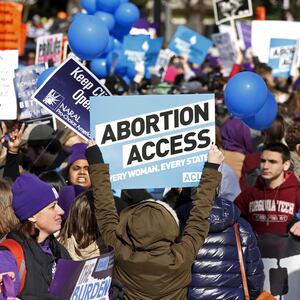The Supreme Court’s decision this week to quietly let Texas’ prohibitive anti-abortion bill take effect is a development many liberals had long predicted and raised millions of dollars to thwart. But even though abortion rights political groups have consistently outraised and outspent their conservative counterparts, they’re still losing the war.
Given the amount of attention and media focus on the massive spending from right-wing dark money groups such as The Federalist Society and Judicial Crisis Network, the disparities are striking. Abortion rights groups—in particular Planned Parenthood, EMILY’s List, and NARAL—have historically dominated anti-abortion organizations in their political spending efforts, and it’s not even close.
Data compiled by the Center for Responsive Politics highlights this contrast. For example, in the 2020 election cycle, top contributor EMILY’s List spent more than $45 million, and entities affiliated with women’s rights organization Planned Parenthood spent about $19 million. But leading anti-abortion political organization Susan B. Anthony’s List spent just shy of $16 million.
The data shows this has held true for the last three decades. Since 1990, Planned Parenthood has made $20.6 million in political contributions and dropped $54.3 million on outside spending, and EMILY’s List has spent tens of millions more than that. Susan B. Anthony’s List, meanwhile, made about $3.6 million in contributions and another $24.9 million in outside spending. And according to CRP, spending by anti-abortion organizations has fallen almost every election cycle dating back to 2012.
Comparative fundraising numbers between pro- and anti-abortion groups reflect the same historical trends.
Yet, in terms of results, the anti-abortion movement appears to have come out on top.
Mary Ziegler, abortion law expert at Florida State University, told The Daily Beast that political spending in itself is not enough. Strategy is what will effect change, she said, and abortion rights groups believed for too long that the courts would simply stand strong with them.
“Some of it is due to the extent to which conservatives care about the courts, something progressives have not historically done. There’s been a unique fixation on the courts among conservatives, some of whom will even hold their nose to vote for someone like [ex-President Donald] Trump because of what it would represent for Roe v. Wade,” Ziegler said.
“There’s a lesson in that, for good or for ill, progressives assumed the federal judiciary would help rather than hurt their causes, often ignoring the courts, and that left an opening conservatives have exploited by realigning themselves to make abortion a ballot-box issue,” she said. “If you rely on the courts too much, you don’t develop other strategies.”
Gretchen Ely, professor and director of the PhD program at the University of Tennessee College of Social Work, echoed the point, emphasizing the power of the emotional triggers that anti-abortion groups have been able to activate.
“The singular grassroots issue for Republicans is this anti-abortion platform, and they’re able to convert and maintain supporters by keeping up this hysteria they wear on their sleeves. The pro-choice people are reacting to this vehement ‘anti-murder’ kind of thing, and it puts them in a position where just saying the word ‘abortion’ is bad,” Ely said. “The typical pro-choice person isn’t wearing that on their sleeve in the same way.”
Ely also noted that Democrats aren’t as single-minded on the issue as Republicans.
“Part of it is that despite how much money we raise to combat the issue, it’s not the primary driver of grassroots efforts,” she said. “Progressive groups focus on a number of other issues, such as voting rights and health care generally.”
Ely noted that the reproductive rights project is by nature more diverse. “For conservatives it’s a single-minded focus, but progressives have to think about more things,” she said, noting the financial demands on numerous fronts, such as outreach, voter education, clinics, and access to health care and contraception.
“Our outreach isn’t just about abortion—it’s crucial, but it’s really a small part of the reproductive justice movement. Planned Parenthood for example spent a lot of time and money advocating for the Affordable Care Act,” she said. “The anti-abortion people just have one thing on their agenda: Stop abortion.”
And it’s not that anti-abortion activists haven’t spent a lot on that agenda. But they typically spend more via so-called “dark money” nonprofits such as The Federalist Society, which can raise unlimited amounts of money without disclosing their donors. That fits into a larger Republican strategy, Ziegler said.
“It’s sort of harder to follow the money with anti-abortion movement, who have also fought to change campaign finance rules generally,” she said. “Pro-life groups have helped other conservative entities raise money this way.”
For an example of this effect, The Washington Post reported that Leonard Leo, one of the main drivers of The Federalist Society’s efforts to transform the federal courts, had as of 2019 helped right-wing dark money groups raise more than $250 million through anonymous donors. And anonymity is key, Ziegler said, especially with a hot-button issue like abortion.
“The intuition that dark money helps conservatives candidates is there because there are plenty of donors who hold controversial positions and don’t necessarily want their names linked to that,” Ziegler said. “If they’re able to funnel money to candidates they like without putting their name on it, they’re eager to do it. That situation is often less true with progressives.”
Ely cited the same point, noting the majority of the public supports some degree of abortion access. She also pointed to the influence of conservative corporate interests such as Hobby Lobby, which in 2014 won a Supreme Court case allowing companies to deny employees contraception coverage based on religious beliefs.
But given the recent anti-abortion legal challenges bubbling from the state level—such as the Texas law, which Florida lawmakers have now said they would try to emulate—progressive groups will likely have to re-engineer their efforts.
A NARAL spokesperson told The Daily Beast that while the organization had seen an uptick in support after a number of states enacted extreme anti-choice legislation, as well as following the death of Justice Ruth Bader Ginsburg, the Texas law may herald a new era.
“The important takeaway from moments like these is that people understand the stakes for reproductive freedom and are moved to take action to support efforts to safeguard and expand access to abortion care. That includes giving to those on the frontlines in states (including abortion funds) and supporting efforts at the federal level to fight back against anti-choice attacks,” the spokesperson said.
Ziegler also put her finger on that concern.
“Going forward, one strategy is that there has not been enough done on the state level, particularly swing states. It’s not an accident you see this coming out of Texas and Florida, both big and not deep-red states, and both saying they’re going to ban abortions,” she said.
“When progressives spend money, they tend to spend on big national races and don’t focus on the state level because it’s harder to understand,” Ziegler added. “That might change to a focus on state races and state courts, because it’s pretty clear the Supreme Court is not going to be helpful at this point.”









